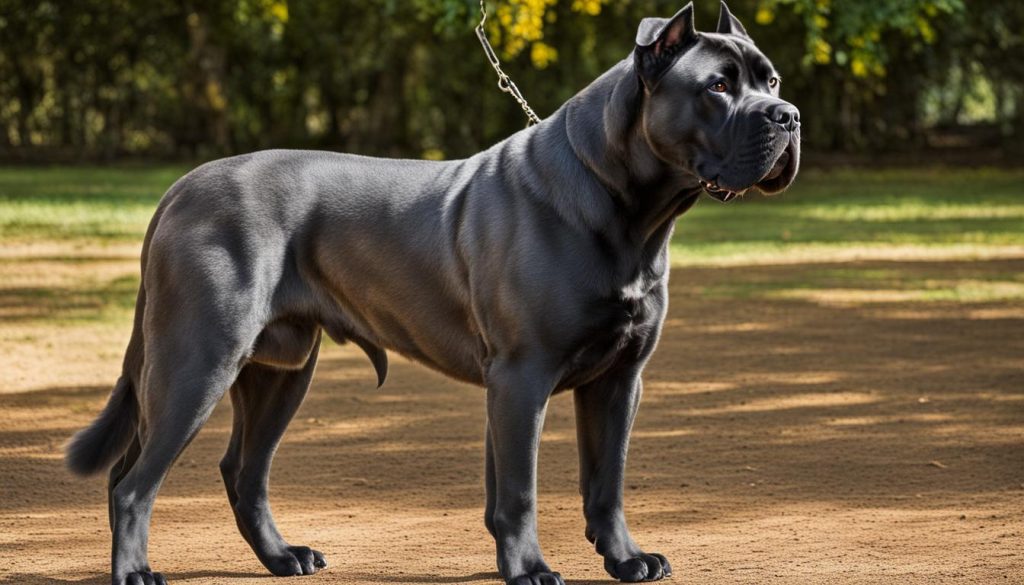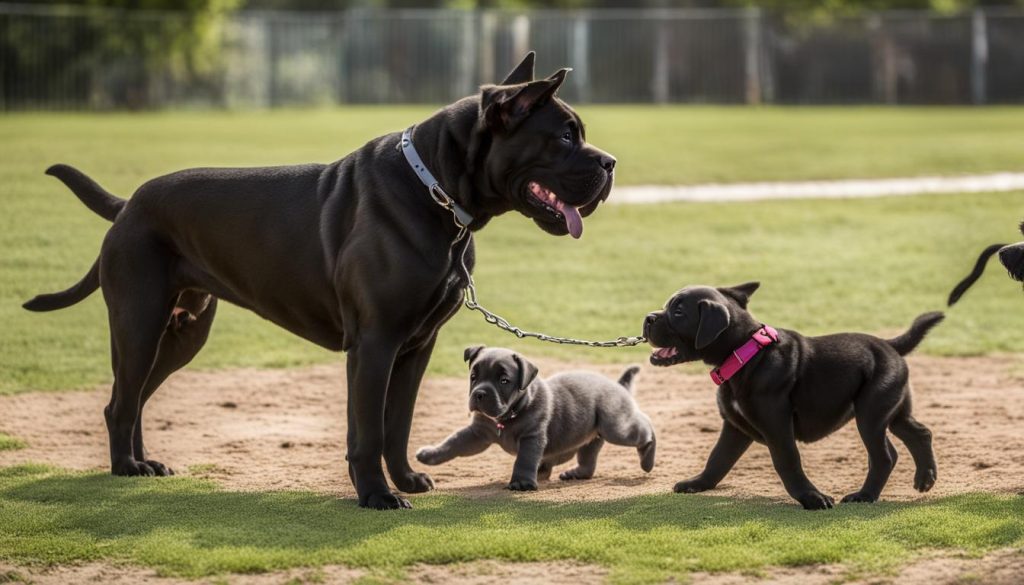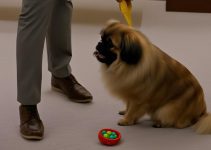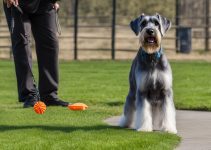Welcome to my guide on Cane Corso training, one of the most intelligent and majestic dog breeds out there. Cane Corsos are known for their strong-willed nature, which requires a strategic approach to training. In this article, I will share valuable insights and expert tips on how to effectively train your Cane Corso, establish basic commands, tackle behavioral challenges, ensure proper socialization, and more. Let’s dive in!
Discover Easy Cane Corso Training Guide
- Understanding a Cane Corso’s temperament is crucial for successful training.
- Establishing basic commands like sit, stay, and come is essential for obedience.
- Properly addressing behavioral challenges such as biting and aggression requires patience and positive reinforcement.
- Socialization plays a vital role in shaping a well-adjusted Cane Corso.
- Consistency and positive reinforcement are key factors throughout the training process.
Understanding Your Cane Corso’s Temperament
When it comes to understanding your Cane Corso’s temperament, it’s important to pay close attention to their body language and vocalizations. These cues provide valuable insights into their emotions and can help you address any behavioral issues they may be experiencing.
A Cane Corso with a relaxed body and a wagging tail is a happy and content dog. On the other hand, a stiff posture may indicate discomfort or aggression, and should be approached with caution. By recognizing these signs, you can ensure your Cane Corso’s well-being and maintain a harmonious relationship.
It’s also crucial to be able to recognize signs of stress or anxiety in your Cane Corso. Excessive licking, panting, or avoidance behaviors are common indications that your dog is feeling stressed. Addressing these signs early on can prevent further behavioral problems and promote a well-adjusted and happy dog.
Understanding your Cane Corso’s temperament is key to providing the right care and Cane Corso training. By being mindful of their body language and recognizing signs of stress or anxiety, you can ensure a healthy and balanced relationship with your Cane Corso.
- A relaxed body and wagging tail indicate happiness
- A stiff posture may suggest discomfort or aggression
- Excessive licking, panting, or avoidance are signs of stress
Establishing Basic Commands
Teaching your Cane Corso basic commands is an essential part of obedience training. By establishing a strong foundation of commands like sit, stay, come, heel, and down, you can ensure better communication and control over your dog’s behavior.
Positive reinforcement training methods have proven to be highly effective when working with Cane Corsos. By rewarding your dog with treats, praise, and affection for obeying commands, you can motivate them to repeat the desired behaviors.
But why stop at verbal commands alone? Cane Corsos are incredibly responsive to visual cues as well. By incorporating hand signals into your Cane Corso training routine, you can enhance communication and make commands more clear and consistent for your dog.
For example, when teaching your Cane Corso to sit, you can pair the verbal command “sit” with a hand signal of raising your hand palm-upward. Over time, your dog will associate the hand signal with the action of sitting, allowing you to use it as a standalone cue when necessary.
Remember to be patient and consistent during Cane Corso training sessions. Break down each command into simple steps and gradually increase the difficulty as your dog becomes more proficient. Regular practice, positive reinforcement, and clear hand signals will help your Cane Corso master basic commands and become a well-behaved companion.

Tackling Behavioral Challenges: Biting and Aggression
Addressing biting and aggression in Cane Corsos requires a thorough understanding of their causes and effective Cane Corso training techniques. With the right approach, these challenges can be overcome to ensure a well-behaved and sociable dog.
Redirecting Unwanted Behaviors
When dealing with biting and aggression, it’s important to redirect your Cane Corso’s behavior towards acceptable alternatives. This can be achieved by providing them with appropriate chew toys and teaching them the “leave it” command. By showing them what they should chew on instead of biting, you can help them develop healthier habits.
Teaching Bite Inhibition
Teaching bite inhibition from an early age is crucial in curbing aggressive behavior in Cane Corsos. It involves teaching them to control the force of their bite, which is a natural behavior for puppies during play. By allowing gentle mouthing and discouraging hard bites, you can train them to be more gentle and less prone to aggressive biting in the future.
Supervised Play with Other Dogs
Another effective way to address biting and aggression is through supervised play with other dogs. Socializing your Cane Corso with well-behaved and tolerant dogs can teach them appropriate bite behavior and encourage positive interactions. This interaction provides an opportunity for them to learn bite inhibition and understand proper play etiquette.
In severe cases of biting and aggression, seeking professional help from a certified dog trainer or behaviorist may be necessary. They can assess the specific needs of your Cane Corso and provide tailored training and behavior modification techniques to address these challenges.
Remember, patience and positive reinforcement in Cane Corso training are key when dealing with behavioral challenges in your Cane Corso. By addressing biting and aggression early on and using effective Cane Corso training methods, you can help your furry companion become a well-behaved and socially adjusted member of your family.
Socialization for a Well-Adjusted Cane Corso
Socialization plays a crucial role in the development of a well-adjusted Cane Corso. By exposing your furry companion to different environments, people, and animals from an early age, you can help build their confidence and prevent fear and aggression later in life.

Gradually introducing your Cane Corso to new situations in a controlled and calm manner is key. Positive experiences during socialization are essential for their growth and overall well-being.
When socializing your Cane Corso, it’s important to expose them to various environments such as parks, busy streets, and different types of indoor and outdoor settings. This exposure helps them become comfortable in different surroundings and prevents them from becoming overwhelmed or fearful.
Introducing your Cane Corso to different people is another crucial aspect of socialization. Encourage them to interact with people of different ages, genders, and ethnicities. This exposure helps your dog develop positive associations and decreases the likelihood of fear or aggression towards unfamiliar people.
Similarly, it’s important to expose your Cane Corso to other animals. This exposure can be through controlled interactions with other well-socialized dogs, visits to dog parks, or supervised playdates. These experiences will help your Cane Corso learn to interact appropriately with other animals and prevent aggressive behavior.
Throughout the socialization process, always prioritize positive experiences. Use positive reinforcement such as treats, praise, and gentle encouragement when your Cane Corso exhibits desired behavior. This positive reinforcement strengthens the bond between you and your four-legged friend and creates positive associations with new environments, people, and animals.
Remember, socialization is an ongoing process that should continue throughout your Cane Corso’s life. By providing them with consistent exposure to various environments, people, and animals, you can help ensure they grow into well-adjusted and confident companions.
Potty Training Your Cane Corso
Consistency is key when it comes to potty training your Cane Corso. By establishing a regular schedule and using positive reinforcement techniques, you can set your dog up for success.
One effective method for potty training is crate training. Dogs naturally avoid soiling their sleeping areas, making a crate an ideal tool for establishing a potty routine. However, it’s important to use crate training appropriately and not as a form of punishment.
To begin crate training, choose a crate that is the appropriate size for your Cane Corso. It should be large enough for them to stand up, turn around, and lie down comfortably. Place bedding and toys inside to create a cozy environment.
Introduce your Cane Corso to the crate gradually. Start by leaving the crate door open and allowing them to explore the crate at their own pace. Encourage them with treats and praise when they enter the crate willingly.
Once your dog is comfortable going in and out of the crate, you can begin using it as a potty training tool. Establish a regular schedule for taking your Cane Corso outside to eliminate, including first thing in the morning, after meals, and before bedtime.
When it’s time for your dog to eliminate, lead them to their designated potty area outside. Use a command like “go potty” to associate the behavior with the command. Be patient and give them ample time to do their business.
If your Cane Corso successfully eliminates outside, reward them with praise and a treat. This positive reinforcement helps reinforce the desired behavior. If your dog has an accident inside, avoid punishment and instead clean up the mess calmly.
Consistency is key throughout the potty and Cane Corso training process. Stick to the established schedule and be patient with your Cane Corso as they learn. With time, they will understand where and when to eliminate, resulting in a well-trained and housebroken dog.
Advanced Training and Activities
Once you have successfully mastered basic obedience training with your Cane Corso, it’s time to take their training to the next level. Advanced training and activities not only provide mental and physical stimulation but also strengthen the bond between you and your furry friend. Let’s explore some exciting options:
Cane Corso Agility Training
Agility training is a fantastic way to challenge your Cane Corso’s physical abilities and improve their overall agility and coordination. Set up an agility course in your backyard or join a local agility club where you can train alongside other dog enthusiasts. Through agility training, your Cane Corso will learn to navigate obstacles such as tunnels, jumps, and weave poles while responding to your commands.
Therapy Dog Training for Cane Corso
If you have a Cane Corso with a calm and gentle temperament, consider undergoing therapy dog training together. As a therapy dog, your Cane Corso can bring comfort and companionship to people in hospitals, nursing homes, and other healthcare settings. Therapy dog training focuses on teaching your Cane Corso appropriate behavior in different environments, how to interact with strangers, and how to provide emotional support.
By participating in advanced training activities like Cane Corso agility training and therapy dog training, you not only provide your furry companion with mental and physical exercise but also tap into their natural instincts and abilities. These activities promote focus, discipline, and a strong bond between you and your Cane Corso.
Conclusion
Effective cane corso training is essential for ensuring a well-behaved and well-adjusted companion. Consistency, patience, and positivity are key throughout the training process. By understanding the cane corso temperament and establishing basic commands, owners can create a strong foundation for obedience training. Tackling behavioral challenges like biting and aggression requires using positive reinforcement techniques and addressing the root causes.
Furthermore, socialization plays a vital role in preventing fear and aggression in cane corsos. Exposing them to various environments, people, and animals from an early age helps build their confidence and promotes positive experiences. Additionally, potty training should be approached with consistency and positive reinforcement methods, such as establishing a regular schedule and using appropriate crate training techniques.
For owners looking to take cane corso training to the next level, advanced training activities like agility or therapy dog training can provide mental stimulation and strengthen the bond with their canine companion. Lastly, professional trainers or training classes can offer additional guidance and support throughout the training journey.
With proper training and positive reinforcement, your cane corso can become a well-trained and well-mannered dog, bringing joy and companionship to your life for years to come.
FAQ
What is the importance of understanding my Cane Corso’s temperament?
Understanding your Cane Corso’s temperament is crucial for effective training. It helps you anticipate their needs and address behavioral challenges. It also allows you to provide the necessary socialization and create a well-adjusted dog.
How can I recognize signs of stress or anxiety in my Cane Corso?
Cane Corsos communicate through body language and vocalizations. Signs of stress or anxiety may include a stiff posture, excessive licking, panting, or avoidance. It’s important to address these signs early to prevent behavioral problems.
What are some basic commands I should teach my Cane Corso?
Teaching basic commands like sit, stay, come, heel, and down is essential for obedience training. Positive reinforcement methods, such as treats and praise, are highly effective in the training process. Combining verbal commands with hand signals can also enhance communication.
How can I address biting and aggression in my Cane Corso?
Addressing biting and aggression requires understanding their causes and using positive reinforcement techniques. Redirecting unwanted behaviors towards acceptable alternatives is important. Teaching bite inhibition from an early age and supervised play with other dogs can also help prevent aggression.
Why is socialization important for my Cane Corso?
Socialization is essential for preventing fear and aggression in Cane Corsos. Exposing them to different environments, people, and animals from an early age helps build their confidence. Gradually introducing them to new situations in a controlled manner ensures positive experiences.
How can I potty train my Cane Corso?
Consistency is key in potty training a Cane Corso. Establishing a regular schedule and using positive reinforcement techniques are important. Crate training can be effective in establishing a potty routine, but it should be used appropriately and not as a punishment.
Are there any advanced training options for my Cane Corso?
After mastering basic obedience, you can consider advanced training options like agility or therapy dog training. These activities provide physical and mental stimulation and strengthen the bond between you and your Cane Corso.
How can I ensure effective cane corso training?
Consistency, patience, and positive reinforcement are key throughout the training process. It’s beneficial to consider professional cane corso trainers or training classes for additional guidance and support. With proper training and positive reinforcement, your Cane Corso can become a well-mannered and obedient companion.






